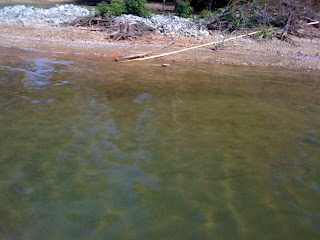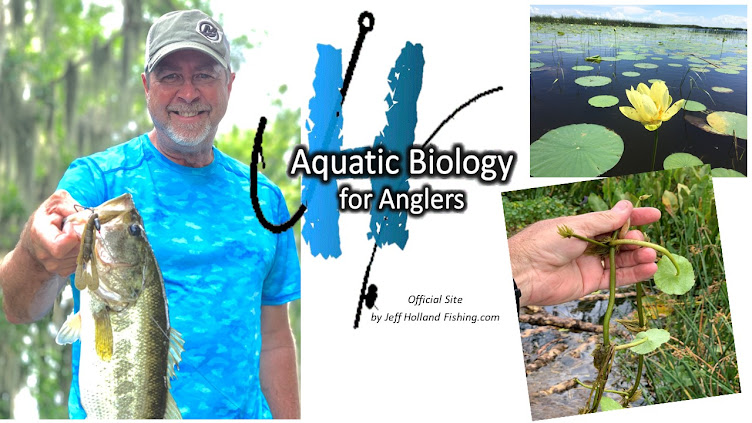- Price of boat gas in South Carolina - $3.34 per gallon;
- Number of anglers I had to compete against - 315;
- Cost of experiencing a lake turnover during a national championship - PRICELESS.

October was a month of change on Lake Murray in Columbia, South Carolina. Warm seventy-degree air temperatures kept the trees believing that summer was still present and leaves remained green. Two small cold spells dropped water temperatures into the high sixties and set the stage for a major lake turnover, when oxygen and water temperatures mix throughout the 200-ft deep reservoir. Local anglers were hardest hit by the devastating effect of this sudden water quality change. The dominate topwater pattern disappeared as schools of striped bass, blueback herring, and largemouth bass scattered and became unpredictable. This turnover leveled the playing field and this Florida angler took advantage of the tough situation and ever changing conditions.
Practice:
Our practice began on a Sunday, with clear sunny skies and a light west wind. Daily air temperatures reached the high 70s F. Hordes of bass and blueback herring were swimming the clear-water shallows near the lower end of the dam. Schools of shad were easily found by any observant angler boating up the stained Saluda River. The tournament was setting up to be a slugfest with local knowledge of offshore brush piles having the advantage.

That all changed when a cool night breeze dropped the surface temperature of the lake lower than the deepest water, causing the oxygen-rich surface waters to sink. United States Geological Survey data confirmed that the oxygen levels on the bottom jump from 1 to 7 part per million (ppm). This over night change allowed fish to roam the entire 200-foot water column. Shad and herring took advantage of this new feeding opportunity and quickly relocated to the food-rich deeper water. Anglers woke up to an entirely different lake system on Monday morning.
My Monday was no different. The fish that followed my topwater lures on Sunday no longer chased the baits. Every bass in my area seem to be sulking, swimming listless, or simply cruising the barren shorelines with bored interest in lures. Rocks, docks, and boat marinas became my dominant pattern for holding bass and a few coves still held herring.
Tuesday marked our last day of practice and I continued to discover and mark waypoints of coves that held good boat docks. I felt that having a large selection of coves was important to get me through a three-day event as the weather was expected to change and the wind was going to blow hard. Tuesday’s practice also gave me a clue to a second behavioral change in the bass: suspending. I noticed several times during my practice bass would follow my bait when I reeled it in to make another cast. To catch these semi-active fish I planned on adding a jerkbait to my lure selection for the tournament.
Tournament:
Day 1: I traveled 30 minutes to my best cove and it remained loaded with the last remaining blueback herring schools and wolf packs of 3-4 pound bass. A topwater lure quickly caught my first bass weighing about 2.5 lbs. Throughout the morning bass would strike my topwater baits but not fully commit to eating them. Something was off and I could not figure it out. I slowed down and began throwing a drop-shot worm around any nearby docks. This proved to be the right move as I landed a good 3.5 lb bass and many short bass. When winds began to blow I used a Rapalla Glidin' Rap over a wind-blown rocky point to catch my last keeper. I ended the day with three bass that gained me 30th place.
 Day 2: Armed with the knowledge of a slow bite I threw my drop-shot worm almost exclusively on the second day and caught five good bass along with many short fish. I moved up two places in the standings to 28th. Topwater lures and jerkbaits continued to only produce short strikes, and again I noticed a lot of bass following my bait as I reeled them in for another cast. This experience mentally ate at me all night long. I did not sleep well as I kept waking up and contemplating on how to catch those 2 and 3 pound bass that followed my baits.
Day 2: Armed with the knowledge of a slow bite I threw my drop-shot worm almost exclusively on the second day and caught five good bass along with many short fish. I moved up two places in the standings to 28th. Topwater lures and jerkbaits continued to only produce short strikes, and again I noticed a lot of bass following my bait as I reeled them in for another cast. This experience mentally ate at me all night long. I did not sleep well as I kept waking up and contemplating on how to catch those 2 and 3 pound bass that followed my baits. Day 3: After a night of restless sleep I settled on rigging up a Zoom fluke jerkbait for getting a reaction bite. When I arrived at my fishing cove on the final day I used the low-light morning hours to fish the jerkbait, but to no avail. I never did figure out the key to getting reaction strikes out of those semi-interested bass. When I finally picked up my drop-shot worm I only caught small sunfish around the docks.
By 10 am I had not caught a single bass and I began to have second thoughts about my entire pattern. I made a cast with the Zoom jerkbait and let it sink next to a dock while I took a mental time-out to think about what to do or change. That’s when it hit me, literally, a small bass hit the jerkbait on the fall and I landed my first keeper. I picked up the drop-shot and started dead sticking the bait next to every boat dock in my area. My dead sticking method consisted on letting the worm lie on the bottom a full minute after each cast. If nothing picked it up, I would cast to the next dock. With time running out I hooked and lost a nice 3-lb bass. I landed one last keeper and headed into the final day weigh-in with only two small bass for the day.
In the end I finished 42nd out of the 316 of the best ABA American Fishing Tour anglers in the US and received a small check. I learned first-hand what a lake turnover would do to bass in the fall. The cool part about the tournament was that I finished highest among the Florida anglers in the Championship, bragging rights that I will cherish for a long time with my Florida friends.
Check out my video on drop-shotting to see the technique I used. http://www.jeffhollandfishing.com/
Jeff

2 comments:
Jeff: Job well done, that boat will come.
Fishing has become one of today's most popular outdoor activities. Thanks for sharing!
Halibut Fishing Specials
Post a Comment